8 Steps to a Successful B2B Social Media Marketing Strategy
According to IDC, social media influences purchasing decisions for 84% of B2B executives and 75% of all B2B buyers. That’s an excellent reason to get involved in B2B social media marketing and convince buyers about the value of your offer.
Read our article, and discover:
- How to start engaging potential customers on social channels and get a satisfying ROI?
- What is B2B social marketing?
- How to create a B2B social media strategy in 8 simple steps?
- Why is social media important in B2B marketing?
- What are the differences between social media marketing B2B and B2C?
- Why do you need a B2B social media marketing agency?
Before beginning social media marketing, you should define the perfect audience, choose social media channels wisely, and schedule your publications’ intensity. Social media marketing in B2B is a challenging way to scale your business, but it’s definitely worth it. So, read our comprehensive article about business-to-business social media strategies and get more quality customers.
What is B2B Social Media Marketing?
B2B social media marketing is a strategic approach businesses employ to connect with their target audience through various social media platforms. It aims to grow organizations by enhancing brand awareness, engagement, and lead generation.
By leveraging multiple social channels, you can create content tailored to new and existing customers.
This involves targeted campaigns designed to build brand awareness, foster brand loyalty, and establish thought leadership by sharing educational content with relevant hashtags and engaging in social listening for audience insights.
Successful B2B social media marketing maximizes engagement through visual storytelling and regular posting across social accounts. It also strengthens brand identity and reputation, facilitating meaningful connections and long-term relationships with potential clients and other businesses.
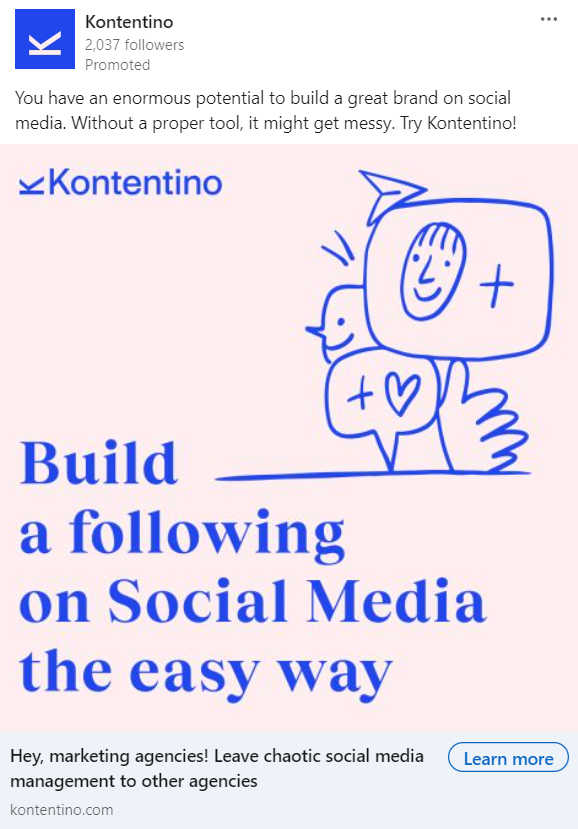
LinkedIn Ads – example.
B2B Social Media Marketing Strategy – How to Create? 8 Simple Steps!
8 crucial steps that help you create a B2B social media marketing strategy:
STEP 1: Know your audience and pick the right social media platforms
We don’t know which social channels your specific audience uses, but we have many statistics that provide the popularity of:
- LinkedIn,
- Facebook,
- Instagram,
- YouTube,
- X (Twitter),
- Reddit,
- TikTok,
- Quora.
Consider a maximum of two or three channels. Don’t start with all networks because creating high-quality entries (or videos) requires much time. Give your audience content to engage them, and after 3–4 months of working on the main channels, you can try the following channels (only if you have time).
The critical information about the most popular social media platforms:
In the B2B sector, 80% of leads come from LinkedIn because that channel is dedicated to professional networking and business-related interactions. Most popular on LinkedIn are professional services (accounting, consulting, legal services), technology (SaaS, cloud computing, cybersecurity), recruitment (talent acquisition, job search platforms, employee training), and marketing (digital marketing agencies, content marketing services, social media management).
Facebook & Instagram
Based on Statista research from January 2023, we also recommend trying Facebook (28% B2B popularity) and Instagram (15% B2B popularity) in niches such as e-commerce (business-to-business product suppliers, wholesalers), software, tools, lifestyle, and event management.
YouTube
Many sources (like Gartner) say that YouTube influences 62% of purchase decisions. You can engage your followers on YouTube with tutorials, how-to videos, product demonstrations, and case studies or testimonials.
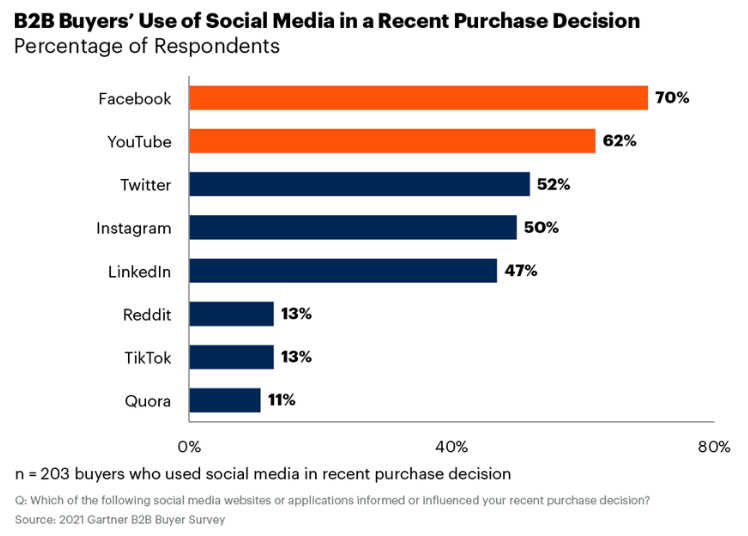
B2B buyers & purchase decisions. Source: www.gartner.com/en/digital-markets/insights/b2b-social-media-channels-for-software-marketers
X (Twitter), Reddit, TikTok, and Quora
We can also recognize X, formerly known as Twitter (52%), Reddit (13%), TikTok (13%), and Quora (11%), as important social media platforms. Your content on these channels can provide a.o.:
- Industry news and updates (on X),
- Expert Q&A (on Quora),
- Behind-the-scenes and educational videos (on TikTok),
- Industry-specific Subreddits (on Reddit).
Remember that your company’s social account isn’t all. As an owner, you must be actively engaging from your private account. 70% of consumers express a stronger connection to a brand when its CEO actively participates on social media. This connection stems from the perception of real people behind the brand.
STEP 2: Check out competitors
Initiating a comprehensive analysis of your competitors’ social media strategies is crucial for understanding market trends and customer expectations. Delve into the types of content they publish, the platforms they prioritize, and their engagement rates. Use social media analytics platforms (e.g., Facebook Ads Manager) to benchmark your performance against theirs and identify areas for improvement. This step provides insights into what works within your industry and helps discover untapped opportunities or gaps in your competitors’ strategies that you can exploit.
STEP 3: Schedule your social media marketing calendar
Be consistent, and take care of quality. Adding only two relevant posts weekly on your social channels is okay, but remember to stick to your chosen intensity. Take care of publishing entries on specific days and concrete hours that can generate the most engagement (e.g., 4 PM on Saturdays and 10 AM on Mondays).
Regularity positively influences algorithms; however, the more essential thing is… your audience. Loyal followers will check your social channel on a given day to read your interesting content or watch a new video. Don’t let them down.
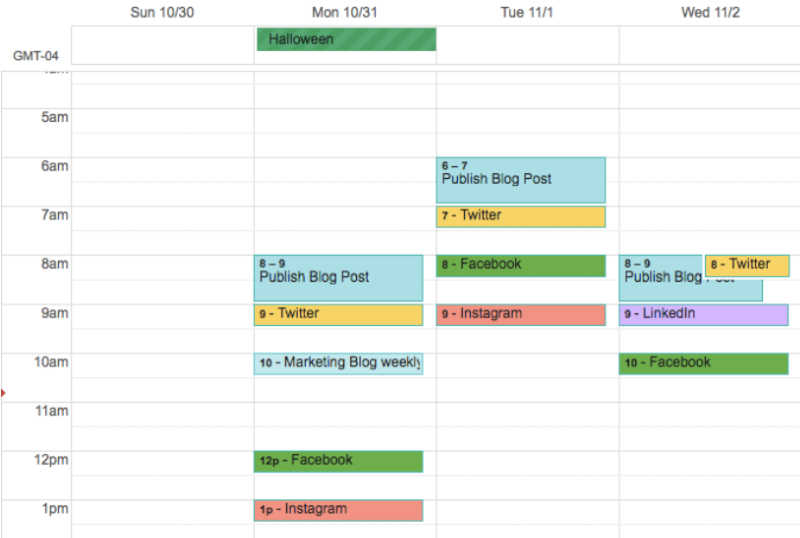
Well-prepared content marketing calendar. Source: blog.hubspot.com/marketing/social-media-calendar-tools
STEP 4: Make original, quality content (to build a trusting community)
Stand out from your competitors by making original, quality, and non-generated content. Speak from your experience (E-E-A-T principles are important), describe an astonishing case study, or maybe show your industry research (leveraging statistics). Embrace innovative approaches – the market is so competitive that only interesting posts aren’t enough.
HubSpot reports that 85% of companies consider short-form videos to be the most impactful form of social content, and 64% of marketers intend to increase their investment in this format. While creating videos, add unique value to show something the competition hasn’t.
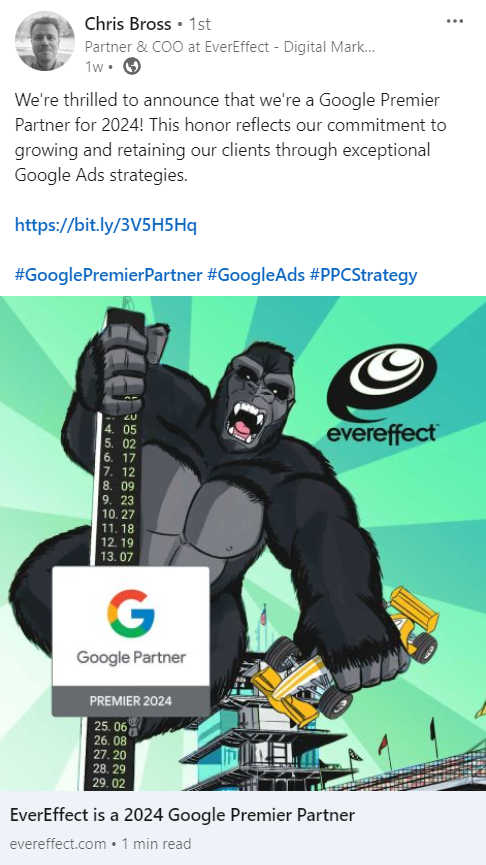
Informational social media content on LinkedIn by Chris Bross – Partner & COO at EverEffect.
STEP 5: Communicate with your followers
Effective communication with your followers isn’t just about responding to comments or messages. It involves creating a two-way dialogue that fosters a community around your brand. Use social media platforms to gather feedback, understand customer pain points, and solicit ideas for product development. Implementing a responsive communication strategy enhances brand loyalty and helps in building trust. Remember, every interaction is an opportunity to demonstrate your brand’s values and commitment to customer satisfaction.
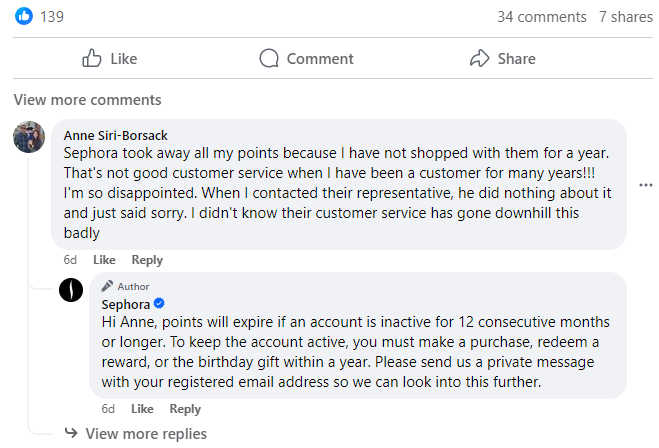
Sephora’s professional approach to customers.
STEP 6: Engage B2B social media ad campaigns
The typical return on investment (ROI) for social media advertising campaigns stands at 250%. However, achieving or surpassing this figure requires a nuanced understanding of your target audience and the unique dynamics of B2B decision-making processes.
Customize your ad campaigns to address the specific needs, challenges, and pain points of businesses in your target market. Utilize advanced targeting options to reach decision-makers within these organizations and craft messages that resonate with their professional interests.
Monitoring and optimizing these campaigns continuously will maximize ROI and ensure your messaging aligns with evolving market demands.
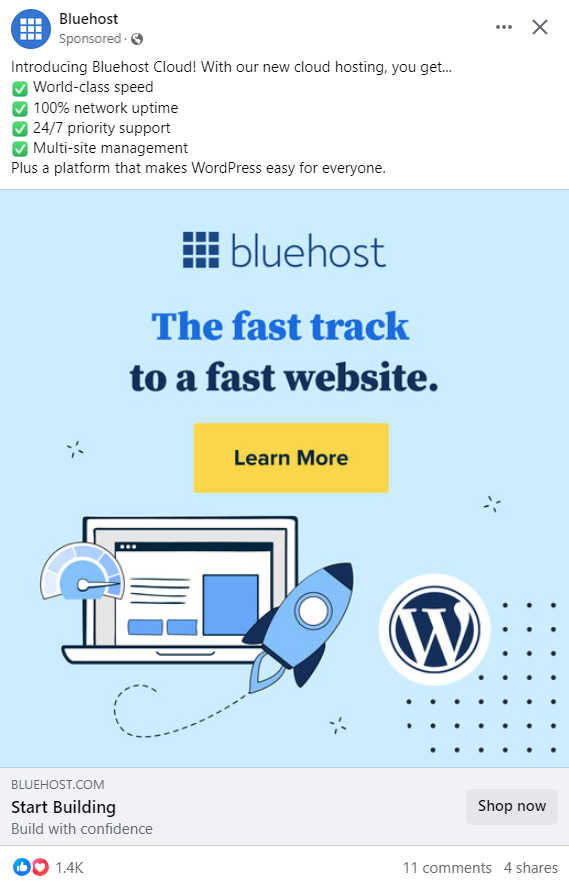
Facebook Ads campaign.
STEP 7: Get many positive reviews
Regardless of whether you’re taking care of Google Business Profile optimization or trying to scale your business on social media, positive reviews are always crucial. 92.4% of individuals surveyed affirm that consulting a reliable review increases their inclination to buy a B2B product.
The best review solutions are accessible on LinkedIn and Facebook. On Instagram, you must add a dedicated post to show your customer statement about your company. For comparison, LinkedIn and Facebook have a specific section for reviews.
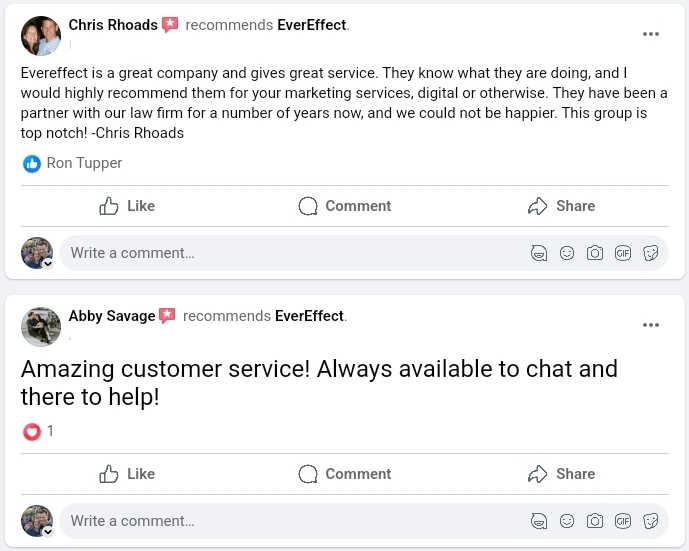
Positive reviews about EverEffect on Facebook Fanpage. Source: www.facebook.com/evereffectdigital/reviews
STEP 8: Track social media KPIs
Tracking Key Performance Indicators (KPIs) on each social media platform is vital for sustainable business growth. Utilizing social media analytics tools, your social media manager (or just you) can quantify the efficacy of the brand’s message across multiple social platforms, ensuring alignment with overarching business objectives.
Analysis should extend to the engagement levels of each blog post and the overall content strategy, scrutinizing how well these elements resonate with the audience and contribute to the brand’s visibility and engagement goals.
Important social media’s KPIs to the following:
- Engagement rate – This includes likes, comments, shares, and saves. High engagement rates indicate that your content resonates well with your audience.
- Reach and impressions – Reach measures how many unique users see your content, while impressions track how often your content is displayed. These metrics help understand your content’s visibility.
- Click-through rate (CTR) – The percentage of people who clicked on a link, CTA, or image in your post. A high CTR indicates effective content that encourages audience action.
- Conversion rate – This tracks how many clicks on your content lead to a desired action, such as signing up for a newsletter or purchasing. It’s vital for measuring ROI from social media efforts.
- Follower growth rate – The speed at which your follower count increases. It reflects brand awareness and appeal.
- Brand mentions – The frequency at which users mention your brand on social media. It can be a measure of brand popularity and user engagement.
- Customer satisfaction score (CSAT) – This score can gauge customer satisfaction and brand sentiment through direct surveys or by monitoring feedback and comments.
Why Do You Need a B2B Social Media Marketing Agency?
Five vital points elucidating why businesses should consider enlisting professional B2B search engine optimization company with expert social media marketing services:
- Expertise in niche targeting – Agencies specializing in B2B social media marketing possess a deep understanding of various industry sectors and their corresponding target audiences. This nuanced expertise enables them to craft highly targeted campaigns that speak directly to your business clients’ specific needs, challenges, and aspirations, ensuring that your marketing efforts resonate with the right decision-makers in your sector.
- Strategic content creation – Content is king in the digital marketing realm, more so in the B2B sector, where purchase decisions are information-driven and often involve multiple stakeholders. A B2B social media marketing agency excels in creating strategic, high-quality content that educates, informs, and engages your target audience, establishing your brand as a thought leader in your industry.
- Data-driven insights – Utilizing advanced analytics tools and methodologies, these agencies can dissect social media data to glean actionable insights about your audience’s behaviors, preferences, and engagement patterns. This data-driven approach optimizes marketing strategies in real-time, ensuring your resources are invested in the most effective channels and tactics.
- Scalability and flexibility – As your business evolves, so too will your social media marketing needs. B2B social media marketing agencies offer the scalability and flexibility to adjust your marketing efforts in alignment with your business’s growth trajectory and shifting market conditions.
- Compliance and reputation management – Navigating the complex web of legal requirements and ethical considerations in social media marketing is challenging, especially for B2B companies that often operate in highly regulated industries. A specialized agency will ensure that your social media activities fully comply with industry regulations and best practices, safeguarding your brand’s reputation and mitigating potential legal risks.
Social Media Marketing B2B vs. B2C – Comparison
Comparison of B2B and B2C social media marketing:
| Aspect | B2B Social Media Marketing | B2C Social Media Marketing |
| Primary goals | Lead generation, brand awareness, relationship building | Brand awareness, customer engagement, sales/conversion |
| Target audience | Other businesses, professionals, decision-makers | General public, individual consumers |
| Key platforms | LinkedIn, Twitter, Industry-specific forums | Facebook, Instagram, TikTok, Snapchat |
| Content type | Educational content, industry news, case studies, whitepapers | Entertaining content, user-generated content, promotions & discounts |
| Engagement style | Professional tone, in-depth discussions, webinars and live Q&A sessions | Informal tone, quick and visual content, contests, polls, and interactive stories |
| Decision-making process | Longer sales cycles, multiple stakeholders involved, requires nurturing and educational content | Shorter sales cycles, emotional and impulse buying triggers, direct call-to-actions |
| Metrics of success | Lead generation rate, conversion rate, engagement within professional circles | Number of followers, engagement rate (likes, shares, comments), conversion rate through direct sales |
| Challenges | Identifying the right decision-makers, creating content that showcases expertise without being too promotional | Standing out in a crowded market, maintaining constant engagement with consumers, adapting to rapidly changing consumer trends and platform algorithms |
| Advertising | More focused on LinkedIn and industry-specific platforms, prioritizes content that educates and nurtures potential leads | Utilizes a broader range of platforms, with a significant emphasis on Facebook and Instagram, leverages emotionally appealing and visually striking advertisements |
| Community building | Focused on creating professional networks, sharing industry insights and best practices | Concentrated on creating brand loyalty, engaging with consumers on a personal level, creating a community feeling around the brand |
| Influencer marketing | Utilizes industry thought leaders and professionals, emphasizes authority and expertise | Leverages popular and niche influencers, focuses on reach and relatability |
| Customer service | Often through direct and private channels, professional and tailored responses | Public and interactive, quick response times expected, utilizes chatbots and instant messaging services for efficiency |
The Importance of Social Media in B2B Marketing – What is the Truth?
Social media in B2B marketing can help your business in many ways.
Firstly, you should know that well-thought-out social media campaigns will generate more potential customers, who will then convert into qualified leads.
The second reason that confirms social media’s importance is relationship building. Your brand can establish trust and credibility through regular interaction, sharing insights, and addressing queries and concerns.
The last reason (but not least) is driving quality traffic to your website. By crafting captivating and distinctive content across your social platforms, you enhance the probability of driving traffic to your website and facilitating conversions, such as completing newsletter subscriptions, scheduling consultations, or completing purchases.
There are dozens of reasons why social media is important in B2B, but the essential point is planning and executing the strategy. An incorrect approach to social media marketing is a complete waste of your time and both a tone of money for paid social posts.
You probably want to maximize your marketing efforts, increase brand awareness, and maximize sales. We can help you build personal relationships on social media and communicate with your customers using a convincing brand voice.
Cooperating with us primarily aims to get more business clients who will generate more sales for your company. Consequently, you’ll earn more, translating to a higher-quality offer and a competitive advantage.
Get your free proposal from the EverEffect team, and leverage social media to scale your business in the B2B sector! You can also call at 888-506-2183.
B2B Social Media Marketing – FAQ
What are the most common answers and questions about B2B social media marketing?
Does social media marketing work in the B2B marketplace?
Yes, social media marketing is highly effective in the B2B marketplace. Various platforms allow businesses to enhance brand engagement, improve brand reputation, and generate leads by reaching and interacting with target audiences. Strategic campaign management on these platforms ensures that relevant content reaches potential buyers, thereby supporting business goals and fostering engaged audiences.
How to do B2B marketing on social media?
B2B marketing on social media involves creating a comprehensive social strategy encompassing competitor research, content creation, and campaign management across various platforms. Businesses should focus on developing a content library that provides value to their target audiences, including insightful blog posts on the company blog and engaging social media content on their accounts. Schedule posts using a content calendar to maximize engagement and ensure consistent brand presence.
How to market B2B on social media?
Companies should leverage social media networks to effectively market B2B on social media to showcase their brand’s value through storytelling and relevant content. They should create content highlighting case studies, testimonials, and other forms of social proof to build trust with potential buyers. Additionally, utilizing social media platforms to engage followers directly can enhance brand reputation and facilitate brand engagement.
How to use social media for B2B marketing?
Using social media for B2B marketing requires a focus on developing a strategic approach to content ideas and posting content that addresses the needs and interests of target audiences. Incorporating a mix of educational and informative content, such as detailed blog posts shared on social media accounts, can help establish thought leadership. Moreover, active engagement and listening on these platforms are crucial for real-time insights and fostering a community around your brand.
How much should you charge to implement a social media strategy for the agency?
Pricing for implementing a social media strategy should reflect the scope of services, including content creation, campaign management, and continuous optimization to meet business goals. Factors such as the size of the target audiences, the number of social media platforms covered, and the frequency of content updates and posts should be considered. It’s essential to align pricing with the value delivered, ensuring it covers the effort in generating leads and enhancing brand engagement.
Which social media channel is the most worthy in B2B?
The most worthy social media channel in B2B varies depending on the target audience and industry. LinkedIn is often regarded as highly effective for B2B marketing due to its professional network, which facilitates targeted brand engagement and lead generation. However, companies should also consider other social media networks where their potential buyers are active, conducting competitor research to inform their social strategy.
How to boost your B2B marketing social media presence without money?
Boosting your B2B marketing social media presence without financial investment involves leveraging organic strategies to engage and grow your audience. Focus on creating high-quality, relevant content that resonates with your target audiences and encourages sharing. Engage directly with followers, participate in relevant discussions, and utilize your company blog to generate content that can be shared across social media accounts. Consistently providing value and maintaining an active presence on various platforms is key to maximizing engagement without a budget.

